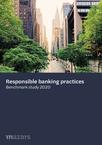Responsible banking practices: benchmark study 2021
The economic strain caused by the Covid-19 pandemic highlights the importance of financial system resilience. Banks from around the globe have acknowledged their key role in helping the transition towards a sustainable future aligned with the objectives of the United Nations’ Sustainable Development Goals and the Paris Agreement.
The study’s third benchmark tackles the responsible banking practices necessary during this tumulus time. It closely analyses the current evolving best practices and developing trends in managing climate change risk along with broader social and governance issues. It builds over Mazars’ previous report: “Responsible banking practices, Benchmark study 2020”, our study shows that banks have taken a collective responsibility towards creating the new foundations of a sustainable financial industry and contribute to building healthier economies.
State of play
For this study, we ‘ve divided 37 banks – based on which’s economically largest, by total assets, and in their respective geographies – into four categories: outstanding, leaders, supporters and followers. The results show a more optimistic future as more banks rank as leaders compared to the last benchmark’s findings. The participants received a positive score between 80% and 95%, despite the tightening of the assessment criteria to reflect the improvement of the practice and requirements.
But there are still issues needed to be addressed. There are regions that are still lagging in applying industry guidelines and ESG-related regulations. The results have shown that strong sustainability practices often come in tandem with consistent industry and legal incentives.

